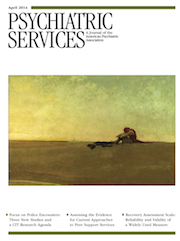Race, Stigma, and Mental Health Referrals Among Clients of Aging Services Who Screened Positive for Depression
Abstract
Objectives
This study examined rates of anticipated stigma and its impact on successful mental health referrals among elderly clients of home-delivered nutrition services who met criteria for depression.
Methods
Elderly clients (N=732) admitted to a home meal program between December 2004 and June 2006 were assessed for depression, cognitive impairment, and anticipated stigma. Gender and race comparisons were conducted, and predictors of receiving a mental health referral were identified.
Results
African Americans were more likely than Caucasians to report high anticipated stigma, and African-American men reported the highest mean scores for anticipated stigma. There were no significant differences between African Americans and Caucasians in rates of depression or mental health referrals. For clients with depression, low anticipated stigma, younger age, and an interaction of race and gender predicted receipt of a mental health referral.
Conclusions
Anticipated stigma can hinder the process of referring older adults for mental health treatment.



